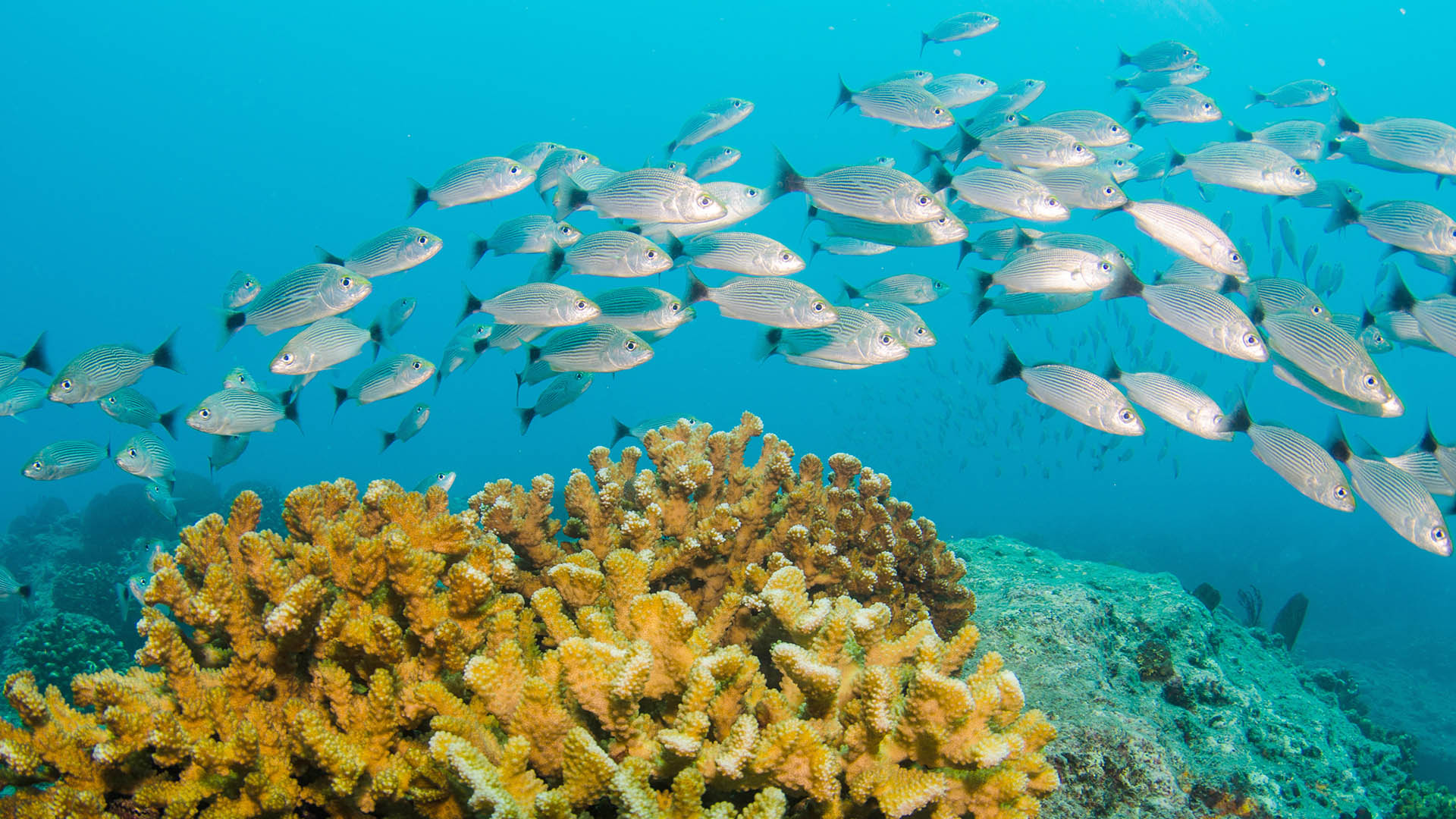Sustainably managing our natural resources will mean that our oceans remain productive, resilient, and adaptable to environmental changes. Healthy marine biodiversity supports the balance of ocean ecosystems, from the smallest plankton to the largest whales. It helps maintain food security, supports livelihoods, and strengthens ocean resilience against climate change.
What is biodiversity?
Biodiversity (a combination of the words ‘biological’ and ‘diversity’) is a term that refers to the variety of life on Earth. It includes all the different animals, plants and micro-organisms living on Earth and in the ocean, from tiny ants to giant whales.
Diversity is calculated by measuring both ‘species richness’ (the number of different species in a defined area) and species composition (the relative proportions of these species). In addition, the ‘abundance’ of a population or a species (the total number of individuals) is also commonly considered when evaluating diversity changes.
In the ocean, biodiversity can refer to the number and abundance of species that coexist in a particular area. Measuring diversity helps scientists monitor the health of marine ecosystems and identify changes caused by human activities or environmental pressures.
Why is marine biodiversity important?
While tropical rainforests have long been considered ‘the lungs of the planet’, far more of the planet’s oxygen (estimated 50-80%) comes from the ocean via photosynthetic marine organisms (NOAA).
As well as contributing to the air we breathe, the ocean plays a role in stabilizing the climate. Seawater evaporates, condenses into clouds, and makes rain and snow that irrigate the land. The ocean and the biodiversity within it play key roles in capturing and storing carbon dioxide. Mangroves and kelp forests protect shorelines and coastal communities from storms and erosion.
The ocean is central to human lives and livelihoods and provides much of the food we eat. Fish is the primary form of protein for more than a third of the global population and wild fisheries provide a livelihood for 60 million people worldwide (UN FAO).
Marine biodiversity is essential because it allows nature to be productive, resilient, and adaptable to environmental changes. These might be caused by climate change, the spread of disease, pollution, invasive species, overfishing or other human-related impacts.
An ecological system is said to be resilient if it keeps functioning even when the population of a species declines, or a species becomes extinct. A functioning ecosystem means the natural processes are working effectively, including those providing goods and services to humans, such as storing carbon, filtering water, or food to eat.
Biodiverse and resilient marine ecosystems are made up of a large and abundant variety of different species. Each species in the ocean has a particular role to play. From tiny krill at the bottom of the ocean food web providing food to ocean mega-fauna like whales, to ocean apex predators such as bluefin tuna that prey on smaller fish and keep their populations in check.
The more that biodiversity becomes depleted, the less nature can provide the food, economic and cultural benefits it currently provides to nature and humanity. But even if humans disappeared tomorrow, biodiversity would still remain vital to the planet’s success.

Does overfishing harm biodiversity?
Yes, fishing that is unsustainable or destructive can seriously impact biodiversity. Around 37.7% of the world’s fish stocks are currently overfished, and if this continues there will be less fish in the ocean for future generations as well as less biodiversity.
Overfishing reduces fish populations, disrupts food webs, and threatens endangered and vulnerable species. Bycatch (unintended catch) is a major contributor to biodiversity loss. Each year, approximately 9.1 million tons of marine life are discarded by commercial fisheries.
How does the MSC Program help protect marine biodiversity?
The MSC program incentivizes sustainable fishing practices that ensure target stocks are healthy, fisheries are well managed, and the impacts on biodiversity are actively minimized.
A key part of the MSC Fisheries Standard assesses how fisheries affect surrounding habitats and marine life. Many fisheries improve their practices through certification conditions, including steps to reduce bycatch and protect endangered, threatened, and protected species.From 2020 to 2023, MSC-certified fisheries made 437 improvements, including 166 that benefited endangered species and 80 that supported ecosystems and habitats.
Supporting global biodiversity conventions with ocean data
How can seafood consumers help support marine biodiversity?
By using the MSC blue fish label on seafood products, brands, retailers, and restaurants are rewarding responsible fishing operations and incentivizing others to improve.
When you choose to eat sustainably certified, wild-caught seafood with the MSC blue fish label, you are helping to support a healthier, more resilient and productive ocean. There are thousands of MSC labelled products sold by retailers and restaurants around the world, making it easy to find sustainably sourced seafood.

.tmb-labelhome.png?Status=Master&Culture=en-US&sfvrsn=e6a3bb14_1)